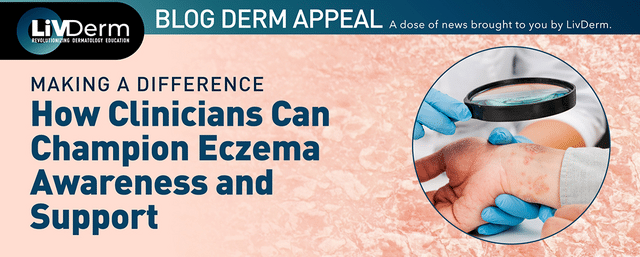Eczema, a chronic inflammatory skin condition that affects millions worldwide, has far-reaching implications for its sufferers. More than just an irritating rash, eczema can significantly impact a patient’s quality of life, affecting sleep, social interactions, mental health, and overall well-being. While there have been many advancements in the management of eczema, effective treatment extends beyond clinical interventions. As clinicians who understand the complexities of this multifaceted condition, there is a crucial role in providing comprehensive support and guidance to better care for patients with eczema. Keep reading to discover the various ways clinicians can contribute to improving outcomes and fostering a more supportive environment for those living with eczema.
Education: Empowering Patients and Families with Knowledge About Eczema
One of the most powerful tools in managing eczema is effective patient education. By establishing open and ongoing communication with your patients and their families, you equip them with the knowledge and skills needed to better understand and manage their condition. This education not only serves to improve treatment adherence but also empowers patients to become more proactive in their own care.
Providing Clear and Accessible Information
Educating patients and their families goes beyond simply distributing pamphlets or other reading materials. It’s about engaging in meaningful discussions and ensuring the information is comprehensive and clearly understood. One of the most crucial steps is to use plain language when communicating—avoiding complex medical jargon. It may also be useful to employ visual aids as they help illustrate key points more effectively. Where possible, offer digital resources they can refer to for additional support, for example, reputable eczema organizations such as the National Eczema Association, which offers a wealth of information and support for people living with eczema.
Dispelling Common Myths and Misconceptions
There are many myths surrounding eczema, such as the misconception that it’s contagious or that it only affects children. It’s essential to address these misunderstandings with your patients and their families, providing accurate and factual information. In doing so, you enable them to advocate for themselves and educate others. This can help in reducing the stigma often associated with patients with eczema and foster a more supportive community.
Shared Decision-Making: Empowering Patients to Take Control of their Eczema
Together with patient education, shared decision-making plays a crucial role in empowering individuals to actively manage their eczema. By involving the patient in their own treatment and management journey, you, as a clinician, are helping them find methods and strategies that align with their lifestyle and preferences. An additional benefit is that patients are much more likely to adhere to a specific treatment plan if they have a say in how it’s developed. It’s important to present all viable options and encourage patients to voice any concerns or preferences. This collaborative approach not only builds trust but also creates a treatment plan that’s more personalized and sustainable for the patient.
Considering Patient Lifestyle and Preferences
Each patient is unique, with their own routines, beliefs, and lifestyle factors. These individual circumstances can significantly affect their ability and willingness to follow a treatment plan. Through direct and open communication, clinicians can better understand these variables and guide patients toward a plan that best suits their needs. Consider the following when discussing treatment options:
· Daily routines and activities
· Potential challenges to specific treatment options
· Cultural and personal preferences
· Comfort level
By taking these factors into account, clinicians can tailor a treatment plan that is not only practical but also likely to be successful and sustainable in the long term. However, it is important to note that shared decision-making is an ongoing process. As the patient’s condition or circumstances change, it’s essential to revisit and adjust the plan as needed. This ensures that the treatment plan remains aligned with the patient’s evolving needs and goals.
Beyond the Skin: Addressing the Emotional and Mental Impact of Eczema
Eczema affects more than just a person’s physical appearance. The mental and emotional strain of living with this condition can significantly impact a patient’s quality of life. As healthcare providers, it’s crucial to acknowledge these aspects of the condition and find ways to better support patients who deal with this daily burden.
Addressing Mental Health Concerns
Due to the physical discomfort caused by eczema, along with the relentless itch that often accompanies it, many individuals experience feelings of frustration, embarrassment, and low self-esteem. These emotional aspects can contribute to conditions such as anxiety, social isolation, and even depression. It is important for clinicians to initiate open conversations with their patients about these concerns and encourage them to ask questions about how eczema is affecting their daily lives.
Explaining the connection between mental health and skin—such as how stress and anxiety can exacerbate symptoms—can offer more insight for patients and may help them better manage their condition. It is useful to also encourage patients to join support groups and reach out to reputable organizations such as those mentioned above so they have the opportunity to connect with others who share similar experiences.
Referring to Mental Health Professionals
While clinicians can offer basic emotional support to their patients, there are times when specialized mental health care becomes necessary. Screening your patients for signs of anxiety or depression can help identify when it may be time for a referral to a mental health professional. Indicators like severe symptoms, extreme sleep disturbances, or social isolation may signal a need for further intervention.
Supporting the mental health of patients with eczema is an integral part of effective disease management and contributes to the improved overall well-being of the patient and better treatment outcomes.
Staying Informed and Updated
The dermatological field is ever-changing and evolving, with new research, treatments, and therapies emerging continuously. As a clinician, staying at the forefront of these advancements and continuously updating your knowledge and skills is a crucial aspect of patient care. By committing to continual learning, you ensure that your patients receive the most current, evidence-based treatment options available.
Continued education is essential not only for professional development but also for maintaining clinical excellence. Participating in webinars and online courses is a convenient way to stay informed and gain access to the latest research and emerging trends in eczema management.
Attending conferences and workshops are also incredibly beneficial in enhancing your skills and expanding your expertise. These events offer a wealth of up-to-the-minute education and often feature dedicated sessions on innovative therapies, case studies, and panel discussions. In addition, they provide an unparalleled platform for networking with colleagues and leading experts in the field.
Take Your Expertise to New Heights
In line with the importance of staying informed and updated, we invite you to register for the 2025 South Beach Symposium (SBS), taking place February 6-8 in Miami Beach. This premier event brings together leading experts in dermatology who are eager to share their invaluable insights. It’s an incredible opportunity to elevate your approach to eczema care and management. Click below to view the full agenda and secure your spot to join us this February.
Additional Resources at Your Fingertips
Our commitment to supporting your continued education remains unwavering. Below, we’ve compiled several eczema-related resources available on our website, including guidelines, expert recommendations, and engaging CME activities. We encourage you to explore these offerings to stay ahead and informed on the evolving landscape of eczema care.
Expanding The Therapeutic “Ahr”Senal for Pediatric Atopic Dermatitis featuring experts Adelaide A. Hebert, MD, Peter A. Lio, MD, and Robert Sidbury, MD, MPH.
Advances in Non-Steroidal Topicals: Pde-4 Inhibitors for Seborrheic Dermatitis and Beyond led by expert Christopher G. Bunick, MD, PhD.
Don’t forget to also tune in to our most recent releases:
Program on JAK Inhibitors for AD
- The Spectrum of Atopic Dermatitis and the Emerging Role of JAK Inhibitors
- JAK Inhibitors in Action: Effectiveness in Atopic Dermatitis
- The Quest for Itch-Free, Clear Skin in Atopic Dermatitis: New Practice-Informing Evidence
- Setting the Stage: Effective Onboarding of your AD Patients onto JAK Inhibitor Therapy
- Choosing the Right Path: JAK Inhibitors or Biologics for Atopic Dermatitis
- Dangers and Side Effects of Steroid Exposure in Treatment of AD
- Skirting Steroids in Atopic Dermatitis: New Therapies and Expert Strategies for Long-term Control
By using these readily available resources and attending events like SBS 2025, you are taking proactive steps to contribute to the advancement of eczema care.


















